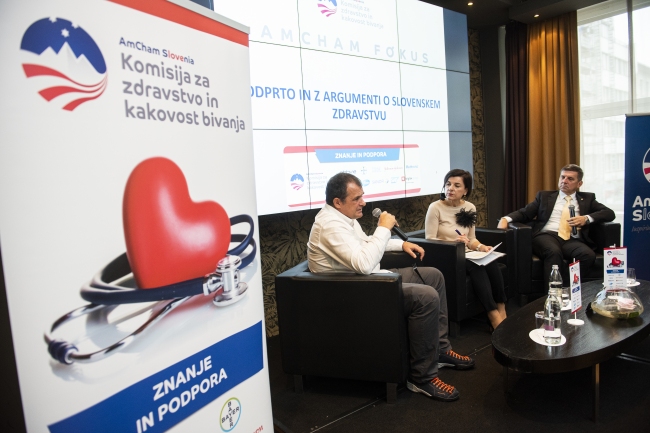A debate on Slovenian healthcare at the AmCham Focus, heard calls for more cooperation between health institutions and decision-makers, and with the pharmaceutical industry.
CEO of insurer Vzajemna Aleš Mikeln said the term public healthcare was often abused and understood as state healthcare. "If we are to make any long-term and serious changes, we must abandon the idea of state healthcare." In public healthcare, it does not matter who provides the service. "For me public healthcare is a system in which I do not go bankrupt if I get sick," he said. Mikeln believes competition is needed among both those who provide funding and those who provide services.
Touching on the two proposals for abolishing the top-up health insurance, Mikeln said those who say there was no solidarity in the top-up insurance system were misleading the public. "There are six categories of solidarity. In line with the principle of income solidarity, funds are collected for obligatory insurance while insurers collect the money for top-up insurance in line with the principle of intergenerational solidarity." The Vzajemna head agrees that the current monthly premium for top-up insurance is too high and that changes are needed. But it is logical that the premiums are rising if the top-up insurers are paying for a fixed percentage of health services, while healthcare spending is rising by the year.
The chair of the haematology unit at the UKC Ljubljana hospital, Samo Zver, said Slovenia's healthcare was comparable to those of the most advanced western countries. "The problem is that people don't appreciate it because they don't know that." But he is concerned about how long the current system will last. A problem he sees at UKC Ljubljana is that chairs of different hospital units must deal with financial issues they are not qualified to deal with. "I'm in charge of a unit with an annual turnover of EUR 40 million," said Zver, a specialist in internal medicine and haematology.
Another problem he pinpointed is the absence of partnership between health institutions and decision-makers, and health institutions and the pharmaceutical industry. "A partnership with the pharmaceutical industry is good for donations for training and equipment, but I find it difficult to understand how someone expects a new product to bring 20-times more than was invested in it." As for partnership with decision-makers, he said he had never been invited for talks and that the initiative had always come from him, but only rarely a dialogue had been set up. Nobody listens to medical experts, he said.
Source: STA
You can see the photos of the event HERE.
.png)
